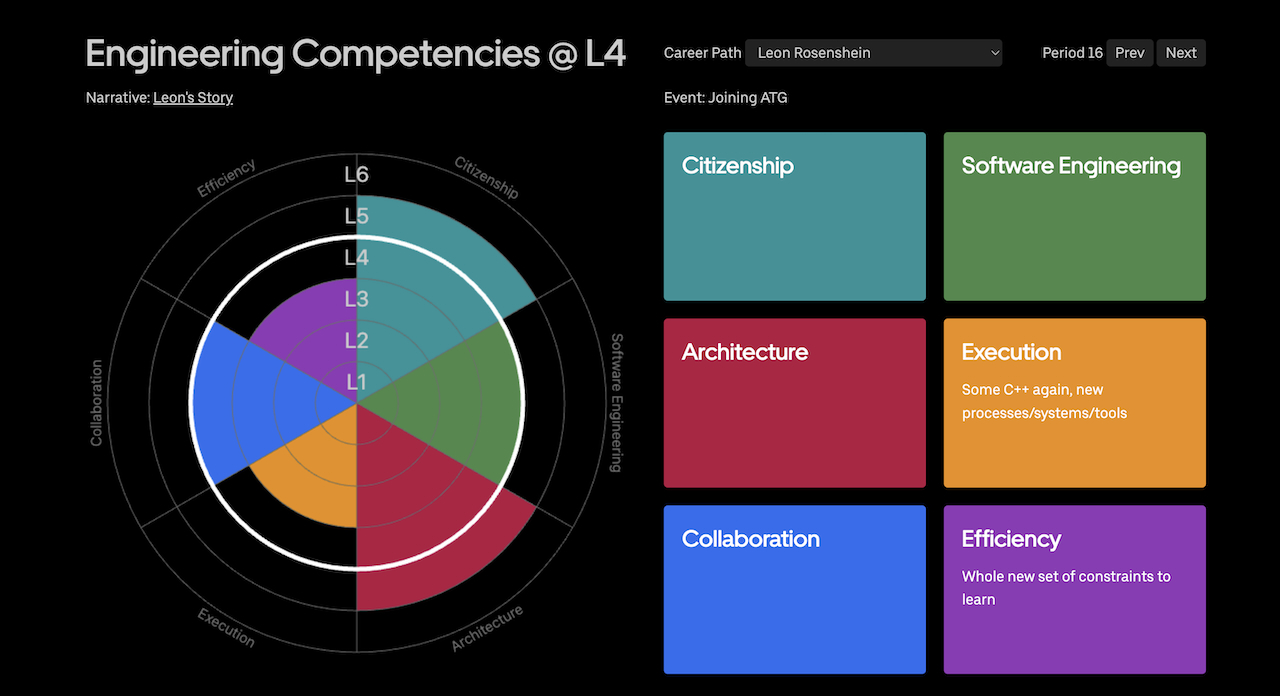Careers are Non-Linear
Hiring has been on my mind lately. I’ve been looking for an entry level developer. Someone just starting out in their career. I’ve described the arc of my career before. In fact, I came up with what I think is a pretty novel (and useful) way to describe the arc of a career. It’s also good for helping you visualize where you are at any given point compared to your company’s (or more specifically your managers) expectations. Anything that helps you do that gap analysis with your manager and guide the discussion on how you’re going to close those gaps is good for your career.
One important thing to keep in mid though, is that while we think of careers as always being “up and to the right”1, that’s not really the case. Especially as it’s perceived by the person living it. In fact, careers, as experienced by the person having the career, are very non-linear. The slope changes. It can even be negative. Particularly in one aspect or another. Even when the overall arc of the career trends towards more scope of influence.
Every career change, whether it’s role on a team, changing teams, promotion to a new level, or changing companies, changes your context. Everything you learned about where you were is still true, in that context. And much of it is still true in your new context. But not all of it.
That’s why your career is non-linear. What you’ve done got you to where you are. It was the right thing at the right time, in the right place. And while I don’t believe that the Peter Principle is generally true, when you start that new role, you definitely know less about it than you did about the role you just left. You don’t get promoted until you can’t do the job. You get promoted until you can’t learn/grow enough to do the next job. And you didn’t get the role change you just made because you can’t do the job. You got it because they do think you can do the job.
Think about it. If you really were ready for that next role (and people know and it was available), you would have gotten it. Since you didn’t, you’ve gone from being at the top of your old role, one of the best around, to being OK at your new role. Not bad, but nowhere near ready for promotion. So compared to other folks in the new role, you’re closer to the bottom that you are to the top. And that can feel like a move backward2.
All of that is when you’re staying in the same basic job/role. Moving from IC to Manager has all of those issues, and a whole set of its own. The same applies when transitioning between Product/Project/Program Management and Development, or really any other “discipline” (using the term very loosely here).
The important thing to remember is that all of these steps are advances in your career. Even if they don’t feel like it to you at the time. Even (especially?) if they feel like more work. When you’re challenged and succeed, you grow.
As has been said, “If you rest, you rust”.
-
Progress being up and to the right is a metaphor. Knowing how we use metaphors, where they come from, and how they can subtly influence things even when you’re not trying, is an important topic, but for another day. Meanwhile, consider Metaphors We Live By and Darmok as tokens of the importance of metaphor in our lives ↩︎
-
Back in the day at Microsoft, the Principal band was levels 65-67. A three level span doesn’t seem like that big a span, but in fact it was huge. L64, senior engineer, was considered a terminal level. If you reached level 64 there was no longer any expectation that you would get promoted or eventually be asked to leave. L59-L63 was considered up or out, the only difference was the time. Moving from L64 to L65 (Senior to Principal) was a big deal. It was an inflection point in your career. From L65 on, even if you had no direct reports, you were expected to show results through others. You still had to do your work, but the big expectation was around how you impacted others. That’s fine and makes sense. The problem was that back then everyone in the Principal band compared to everyone else in the same band. And newly promoted folks at L65 were being compared to folks at L67 who were being considered for promotion. L68 was Vice President. So the first review cycle as a new L65 you were suddenly compared to someone about to be one of the Vice Presidents. Unsurprisingly, L65s didn’t come out well in that comparison. It certainly felt like a step backwards. Talk about imposter syndrome. ↩︎

